Unit 1 Playing Sports Topic 3 Section D(课件)八年级英语上册(仁爱版)(共33张PPT,内嵌音视频)
文档属性
| 名称 | Unit 1 Playing Sports Topic 3 Section D(课件)八年级英语上册(仁爱版)(共33张PPT,内嵌音视频) |
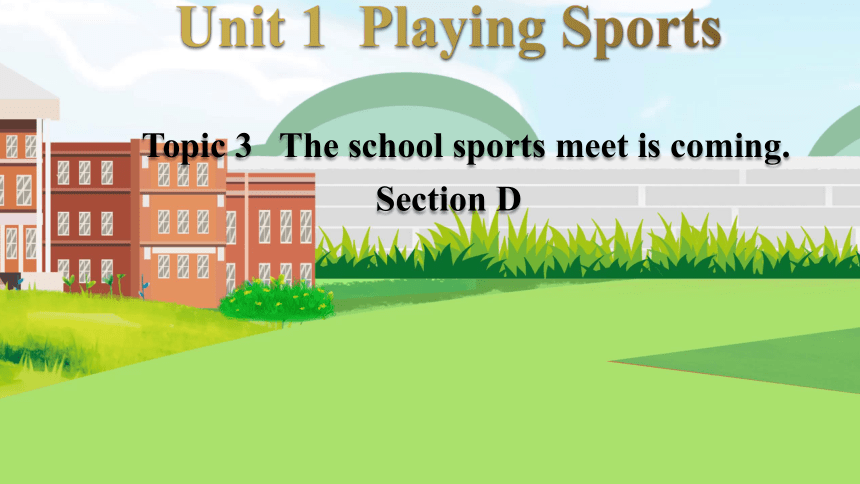
|
|
| 格式 | pptx | ||
| 文件大小 | 47.7MB | ||
| 资源类型 | 教案 | ||
| 版本资源 | 仁爱科普版 | ||
| 科目 | 英语 | ||
| 更新时间 | 2023-09-07 09:23:37 | ||
图片预览

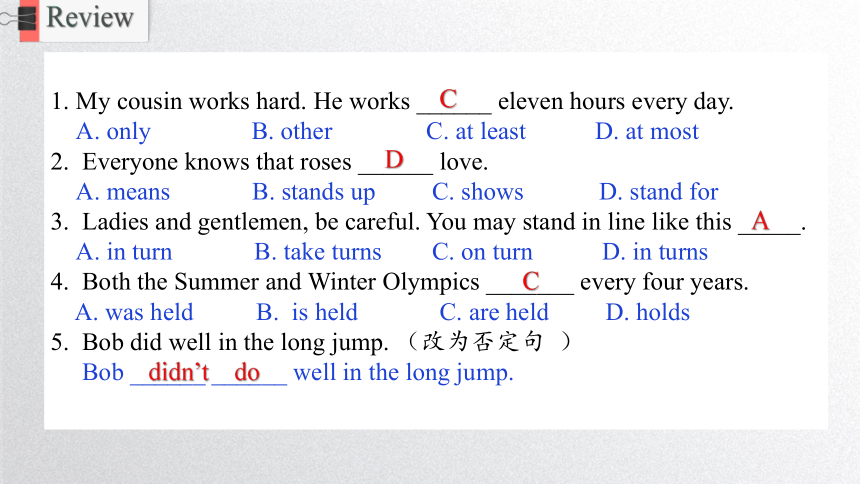
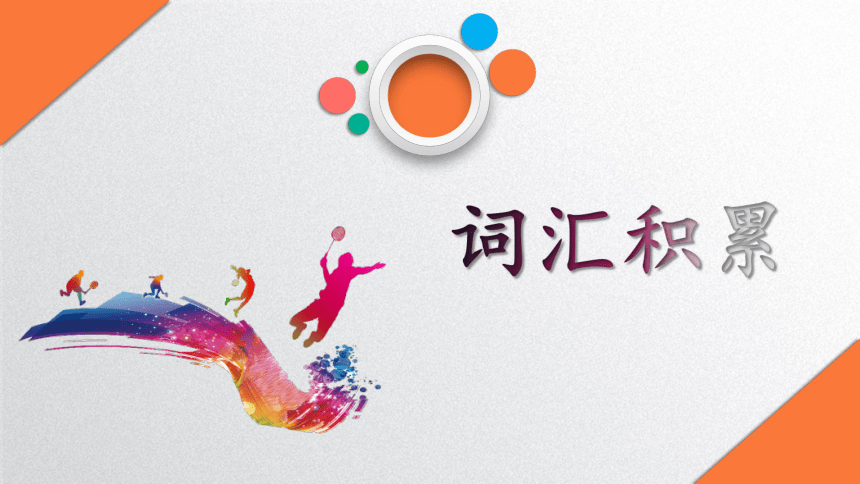
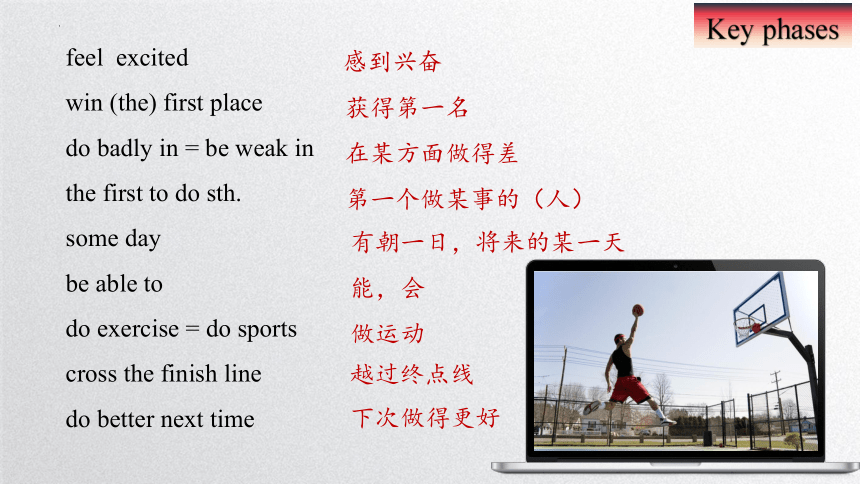
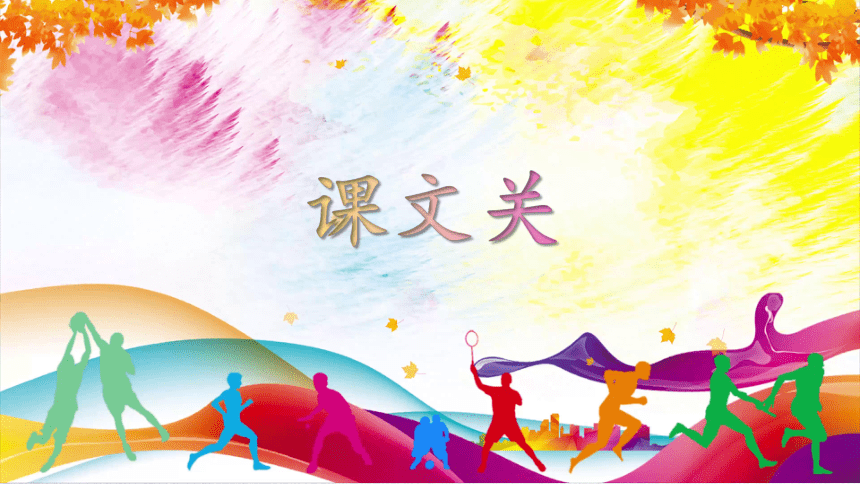
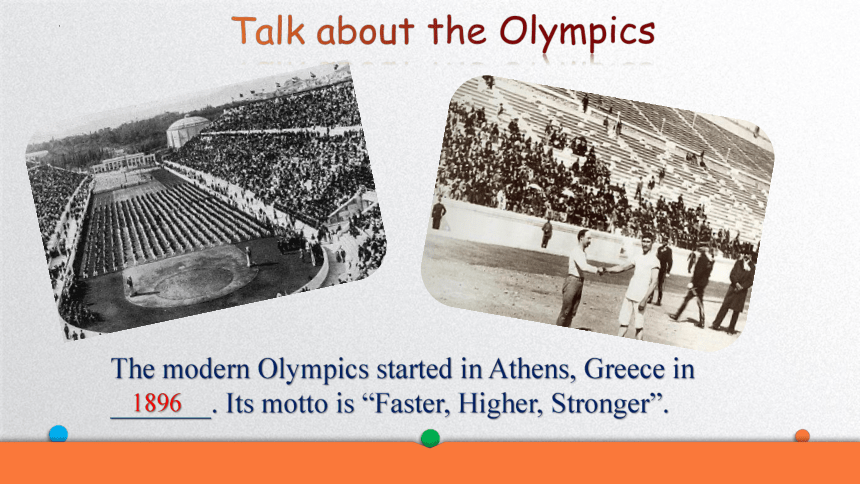
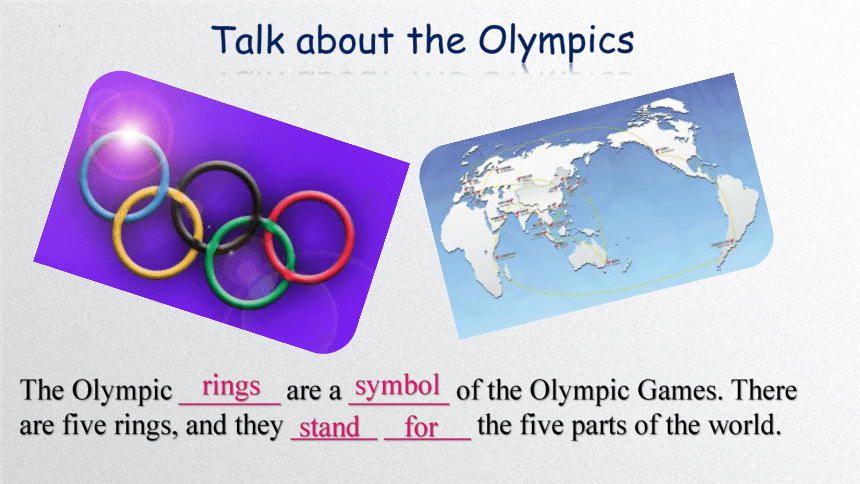
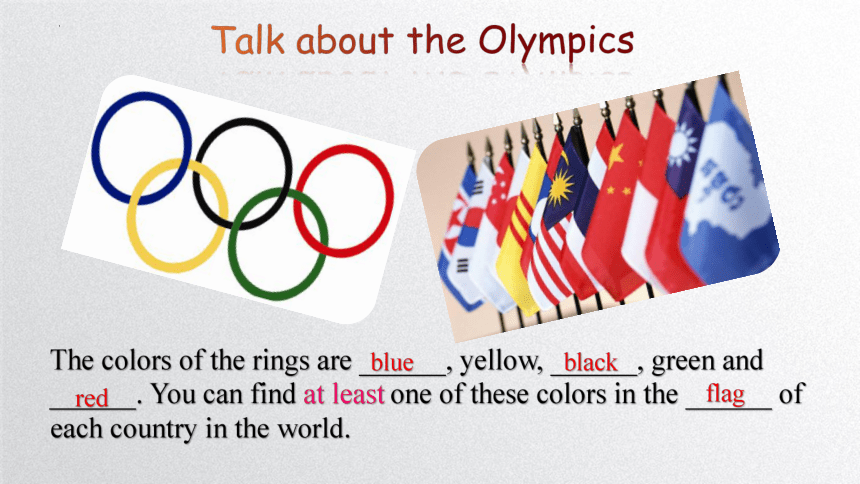
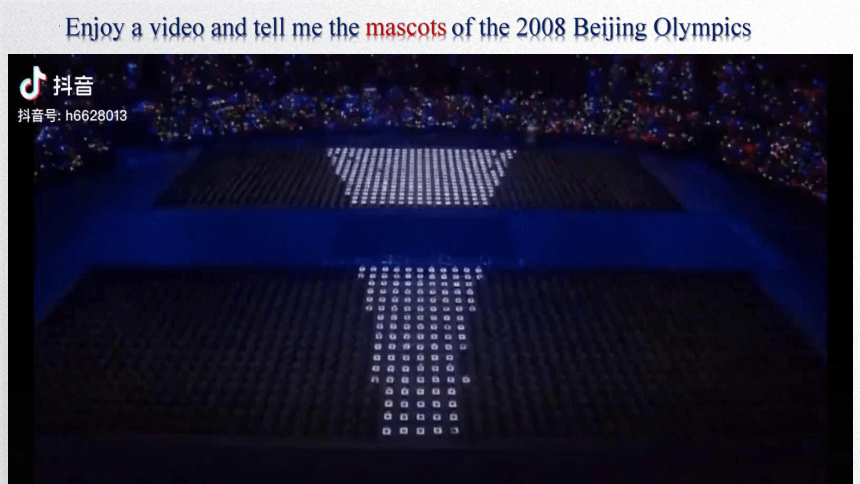
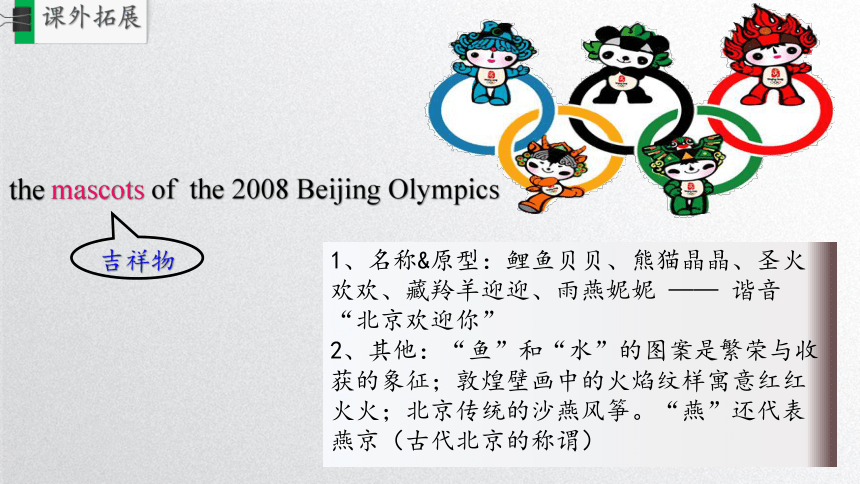
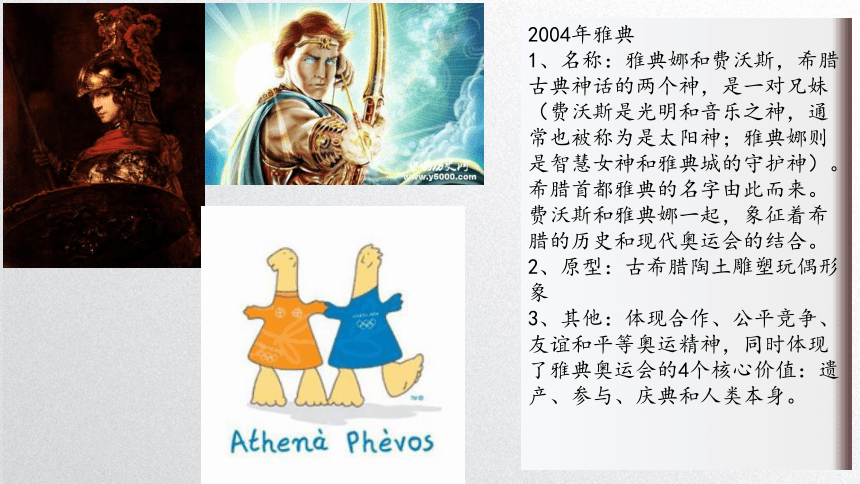
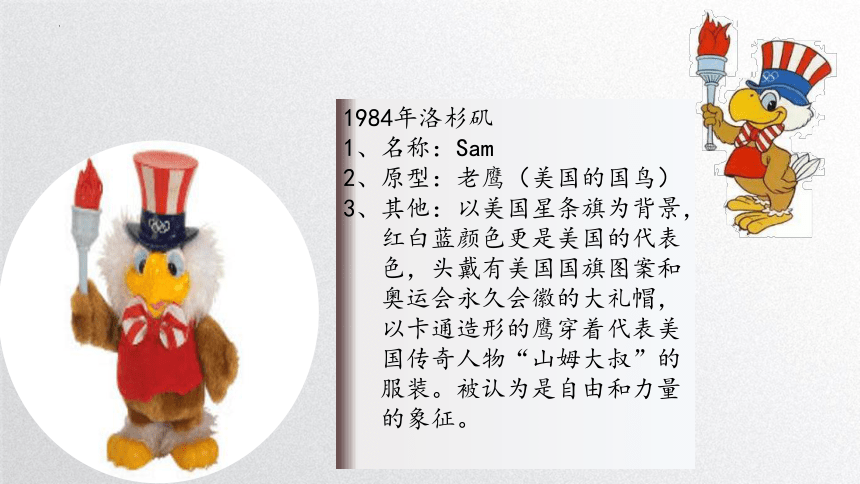
文档简介
(共33张PPT)
Unit 1 Playing Sports
Topic 3 The school sports meet is coming.
Section D
1. My cousin works hard. He works ______ eleven hours every day.
A. only B. other C. at least D. at most
2. Everyone knows that roses ______ love.
A. means B. stands up C. shows D. stand for
3. Ladies and gentlemen, be careful. You may stand in line like this _____.
A. in turn B. take turns C. on turn D. in turns
4. Both the Summer and Winter Olympics _______ every four years.
A. was held B. is held C. are held D. holds
5. Bob did well in the long jump. (改为否定句 )
Bob ______ ______ well in the long jump.
C
D
A
C
didn’t do
Review
词汇积累
feel excited
win (the) first place
do badly in = be weak in
the first to do sth.
some day
be able to
do exercise = do sports
cross the finish line
do better next time
感到兴奋
在某方面做得差
第一个做某事的(人)
有朝一日,将来的某一天
能,会
做运动
越过终点线
获得第一名
下次做得更好
Key phases
课文关
The modern Olympics started in Athens, Greece in _______. Its motto is “Faster, Higher, Stronger”.
Talk about the Olympics
1896
The Olympic _______ are a _______ of the Olympic Games. There are five rings, and they ______ ______ the five parts of the world.
Talk about the Olympics
symbol
rings
stand for
The colors of the rings are ______, yellow, ______, green and ______. You can find at least one of these colors in the ______ of each country in the world.
blue
black
red
flag
Talk about the Olympics
Enjoy a video and tell me the mascots of the 2008 Beijing Olympics
the mascots of the 2008 Beijing Olympics
吉祥物
1、名称&原型:鲤鱼贝贝、熊猫晶晶、圣火欢欢、藏羚羊迎迎、雨燕妮妮 —— 谐音“北京欢迎你”
2、其他:“鱼”和“水”的图案是繁荣与收获的象征;敦煌壁画中的火焰纹样寓意红红火火;北京传统的沙燕风筝。“燕”还代表燕京(古代北京的称谓)
课外拓展
2004年雅典
1、名称:雅典娜和费沃斯,希腊古典神话的两个神,是一对兄妹(费沃斯是光明和音乐之神,通常也被称为是太阳神;雅典娜则是智慧女神和雅典城的守护神)。希腊首都雅典的名字由此而来。费沃斯和雅典娜一起,象征着希腊的历史和现代奥运会的结合。
2、原型:古希腊陶土雕塑玩偶形象
3、其他:体现合作、公平竞争、友谊和平等奥运精神,同时体现了雅典奥运会的4个核心价值:遗产、参与、庆典和人类本身。
1984年洛杉矶
1、名称:Sam
2、原型:老鹰(美国的国鸟)
3、其他:以美国星条旗为背景,
红白蓝颜色更是美国的代表
色,头戴有美国国旗图案和
奥运会永久会徽的大礼帽,
以卡通造形的鹰穿着代表美
国传奇人物“山姆大叔”的
服装。被认为是自由和力量
的象征。
2000年悉尼夏季奥运会吉祥物是三个澳大利亚本土动物:笑翠鸟“奥利”Olly、鸭嘴兽“悉德”Syd、针鼹“米利”Millie.
2012年伦敦
1. 名称:文洛克,名字来源于什罗普郡的马奇温洛克小镇,那里仍然举办着传统的马奇温洛克运动会。
2.原型:以富有激情的萨罗普羊为原型
3. 其他:其金属外形是用建造伦敦奥林匹克体育场的最后一批钢铁滴制而成。
Match the mascots with the host cities.
Los Angeles 1984
Athens 2004
Beijing 2008
London 2012
Project
Read Kangkang’s diary and mark T (True) or F (False).
Kangkang’s school held a sports meet last week.
( )
2. Kangkang’s class was first in the boys’ relay race.
( )
3. Yu Ting did well in the high jump.
( )
4. Kangkang won the boys’ 400-meter race.
( )
5. Kangkang wants to be a basketball player when he grows up.
( )
T
T
T
F
F
Work alone
Number the following sentences in the right order according to Kangkang’s diary .
( ) Kangkang won the boys’ 400-meter race.
( ) Yu Ting did well in the long jump.
( 1 ) Our school held a wonderful sports meet.
( ) Kangkang wants to be a soccer player
when he grows up.
( ) Kangkang’s class was first in the boys’
relay race.
4
3
5
2
Sunday, Sept. 21st Sunny
Last week our school held a sports meet. Everyone in our class felt very excited because we won. In the boys' relay race, Michael ran very fast and our class won first place. Yu Ting is good at the long jump and she also won. We’re sorry that we did badly in the high jump, but we’re sure we will do better next time.
I took part in the boys’ 400-meter race. I did my best and was the first to cross the finish line. Now I love sports more. I want to be a soccer player. I will do more exercise every day and I hope some day I’ll be able to take part in the Olympic Games.
Work in pairs
School Sports Meet
Michael — the boys’ relay race
Yu Ting — the long jump
We — the high jump
Kangkang — the boys’ 400-meter race, the
Olympic Games
Retell Kangkang’s diary according to the key words.
Read through Sections A-C and think about how to use will/shall correctly and fill in the blanks of the function sentences.
Grammar
I’ll be in the long jump and the high jump. I believe you will win.
Which sport will you take part in I won’t lose.
Shall I take my camera What shall we take
Future Tense with will/shall
Functions
The school sports meet __________ tomorrow.
When shall we meet Let’s _______ it half past six.
_______ shall we meet At my house.
I hope _______. It’ll be ________.
is coming
make
Where
exciting
so
语法关
Key points
1. Everyone in our class felt very excited.
feel常用作连系动词,其后跟形容词作表语,意为“感觉......”。
拓展:用作系动词,后跟形容词作表语的连系动词还有:smell闻起来,taste尝起来,sound听起来,look看起来,get变得,turn变得+(颜色)等。
eg. It _____ warm in spring. 春天天气变暖和了。
The leaves _____ yellow in fall. 秋天树叶变黄了。
That ______ great. 听起来不错。
gets
turn
sounds
Key points
2. We’re sorry that we did badly in the high jump, but we’re sure we can do better next time.
(1)do badly in“在某方面做得差”,相当于be weak in,和do well in/be good at的意思相反。in和at都为介词,后跟名词、代词或动名词。
(2)句中的time,表示“时间”,是不可数名词;time表示“次数”,是可数名词,once一次,twice两次,three times三次。
及时练习:
Tom _____ English two years ago, but now he ____ it.
A.is good at; do badly in B. does badly at; is good at
C.was good at; did badly in D.did badly in; is good at
D
Key points
3. I did my best and was the first to cross the finish line.
(1)be the first to do...第一个做......的人。
eg. Mr. Chen is often the last to leave.
(2)finish line终点线,starting line起跑线
拓展:finish可作动词,意为“完成”,
finish doing sth.做完某事。
及时练习:
My daughter finished _______ (read) the book
yesterday.
reading
4. I hope some day I'll be able to take part in the Olympic Games.
我希望有朝一日我能够参加奥运会。
① be able to:能够做某事
be able to can 例句
可用于任何时态,如: was/ were able to will/ shall be able to have/ has been able to 只有can 和could
表示过去通过努力终于做成了某事
表示猜测,主要用于疑问句和否定句 e.g. The watch can be Linda's. She is looking for it.
表示允许,与may互换 e.g. Can/ May I help you
some day(某一天,有一天) one day(某一天,有一天)
多用于将来时 可指过去(过去时)
或将来(将来时)
eg. I want to be a person like him some day. eg. One day the Smiths spent an hour walking to the park.
②some day将来的某一天
及时练习:
1. I’m sure I will climb up the Great Wall ______.
A. someday B. some times C. some day D. some days
2. My brother learnt a little English. He _____ talk with a foreigner who comes from America.
A. can be able to B. be able to C. am able to D. may be able to
3. She is able to write a letter. (改为同义句)
She _____ ______ a letter.
4. Could you read when you were five (改为同义句)
_____ you _____ _____ read when you were five
5. I couldn’t see him again after he left. (改为同义句)
I _____ _____ _____ see him again after he left.
C
D
can write
Were able to
wasn’t able to
Exercises
I、根据所给首字母提示,填空,使句子意思通顺并完整。
1. Li Ming passed the s____ to Kangkang quickly
in the relay race.
2. Look! Children are p______ apples in the tree.
3. We did our best to help v________ in the 2008
Beijing Olympics.
4. Our e_______________ is becoming better and
better in Beijing.
tick
icking
isitors
nvironment
II、用所给动词的适当形式填空,注意句子时态。
1. Would you mind ________ (fill) out the form
2. It will be sunny on Saturday. What about ______ (go) hiking
3. —When ______ we ______ (meet) tomorrow
—Let’s make it half past six.
4. He _________ (visit) Beijing in August in 2008.
5. Beijing ______ (host) the 29th Olympic Games.
filling
going
shall meet
visited
hosted
Exercises
III、Replace the underlined parts of the conversation after the example.
Example: taught me some magic tricks. taught some magic tricks to me.
Kangkang: Hi, Michael, my uncle taught me some magic tricks this weekend.
...taught some magic tricks to me...
Michael: Really Would you please show me the magic tricks
...show the magic tricks to me...
Kangkang: Sure. Pass me a cup and a newspaper. I can make you some flowers.
Pass a cup and a newspaper to me. ...make some flowers for you.
Michael: Great! Can you teach me
Kangkang: Of course. I am going to buy you a magic book tomorrow.
...buy a magic book for me...
Summary
We can:
We learn:
The year of the first modern Olympics.
The host city of the first modern Olympics.
The motto of the Olympics games.
The symbol of the Olympics games.
The five rings stand for the five parts of the world.
The colors of the rings are black, blue, yellow, green and red.
The Summer Olympic Games are held every four years.
Talk about the school sports meet.
Homework
3. Finish Section D in your workbook.
Read 1a.
2. According to the survey and the key phrases ,write a passage about the 24th Winter Games with the future tense. (80--100 words )
4. Preview Section A in next topic.
Thank you!
Unit 1 Playing Sports
Topic 3 The school sports meet is coming.
Section D
1. My cousin works hard. He works ______ eleven hours every day.
A. only B. other C. at least D. at most
2. Everyone knows that roses ______ love.
A. means B. stands up C. shows D. stand for
3. Ladies and gentlemen, be careful. You may stand in line like this _____.
A. in turn B. take turns C. on turn D. in turns
4. Both the Summer and Winter Olympics _______ every four years.
A. was held B. is held C. are held D. holds
5. Bob did well in the long jump. (改为否定句 )
Bob ______ ______ well in the long jump.
C
D
A
C
didn’t do
Review
词汇积累
feel excited
win (the) first place
do badly in = be weak in
the first to do sth.
some day
be able to
do exercise = do sports
cross the finish line
do better next time
感到兴奋
在某方面做得差
第一个做某事的(人)
有朝一日,将来的某一天
能,会
做运动
越过终点线
获得第一名
下次做得更好
Key phases
课文关
The modern Olympics started in Athens, Greece in _______. Its motto is “Faster, Higher, Stronger”.
Talk about the Olympics
1896
The Olympic _______ are a _______ of the Olympic Games. There are five rings, and they ______ ______ the five parts of the world.
Talk about the Olympics
symbol
rings
stand for
The colors of the rings are ______, yellow, ______, green and ______. You can find at least one of these colors in the ______ of each country in the world.
blue
black
red
flag
Talk about the Olympics
Enjoy a video and tell me the mascots of the 2008 Beijing Olympics
the mascots of the 2008 Beijing Olympics
吉祥物
1、名称&原型:鲤鱼贝贝、熊猫晶晶、圣火欢欢、藏羚羊迎迎、雨燕妮妮 —— 谐音“北京欢迎你”
2、其他:“鱼”和“水”的图案是繁荣与收获的象征;敦煌壁画中的火焰纹样寓意红红火火;北京传统的沙燕风筝。“燕”还代表燕京(古代北京的称谓)
课外拓展
2004年雅典
1、名称:雅典娜和费沃斯,希腊古典神话的两个神,是一对兄妹(费沃斯是光明和音乐之神,通常也被称为是太阳神;雅典娜则是智慧女神和雅典城的守护神)。希腊首都雅典的名字由此而来。费沃斯和雅典娜一起,象征着希腊的历史和现代奥运会的结合。
2、原型:古希腊陶土雕塑玩偶形象
3、其他:体现合作、公平竞争、友谊和平等奥运精神,同时体现了雅典奥运会的4个核心价值:遗产、参与、庆典和人类本身。
1984年洛杉矶
1、名称:Sam
2、原型:老鹰(美国的国鸟)
3、其他:以美国星条旗为背景,
红白蓝颜色更是美国的代表
色,头戴有美国国旗图案和
奥运会永久会徽的大礼帽,
以卡通造形的鹰穿着代表美
国传奇人物“山姆大叔”的
服装。被认为是自由和力量
的象征。
2000年悉尼夏季奥运会吉祥物是三个澳大利亚本土动物:笑翠鸟“奥利”Olly、鸭嘴兽“悉德”Syd、针鼹“米利”Millie.
2012年伦敦
1. 名称:文洛克,名字来源于什罗普郡的马奇温洛克小镇,那里仍然举办着传统的马奇温洛克运动会。
2.原型:以富有激情的萨罗普羊为原型
3. 其他:其金属外形是用建造伦敦奥林匹克体育场的最后一批钢铁滴制而成。
Match the mascots with the host cities.
Los Angeles 1984
Athens 2004
Beijing 2008
London 2012
Project
Read Kangkang’s diary and mark T (True) or F (False).
Kangkang’s school held a sports meet last week.
( )
2. Kangkang’s class was first in the boys’ relay race.
( )
3. Yu Ting did well in the high jump.
( )
4. Kangkang won the boys’ 400-meter race.
( )
5. Kangkang wants to be a basketball player when he grows up.
( )
T
T
T
F
F
Work alone
Number the following sentences in the right order according to Kangkang’s diary .
( ) Kangkang won the boys’ 400-meter race.
( ) Yu Ting did well in the long jump.
( 1 ) Our school held a wonderful sports meet.
( ) Kangkang wants to be a soccer player
when he grows up.
( ) Kangkang’s class was first in the boys’
relay race.
4
3
5
2
Sunday, Sept. 21st Sunny
Last week our school held a sports meet. Everyone in our class felt very excited because we won. In the boys' relay race, Michael ran very fast and our class won first place. Yu Ting is good at the long jump and she also won. We’re sorry that we did badly in the high jump, but we’re sure we will do better next time.
I took part in the boys’ 400-meter race. I did my best and was the first to cross the finish line. Now I love sports more. I want to be a soccer player. I will do more exercise every day and I hope some day I’ll be able to take part in the Olympic Games.
Work in pairs
School Sports Meet
Michael — the boys’ relay race
Yu Ting — the long jump
We — the high jump
Kangkang — the boys’ 400-meter race, the
Olympic Games
Retell Kangkang’s diary according to the key words.
Read through Sections A-C and think about how to use will/shall correctly and fill in the blanks of the function sentences.
Grammar
I’ll be in the long jump and the high jump. I believe you will win.
Which sport will you take part in I won’t lose.
Shall I take my camera What shall we take
Future Tense with will/shall
Functions
The school sports meet __________ tomorrow.
When shall we meet Let’s _______ it half past six.
_______ shall we meet At my house.
I hope _______. It’ll be ________.
is coming
make
Where
exciting
so
语法关
Key points
1. Everyone in our class felt very excited.
feel常用作连系动词,其后跟形容词作表语,意为“感觉......”。
拓展:用作系动词,后跟形容词作表语的连系动词还有:smell闻起来,taste尝起来,sound听起来,look看起来,get变得,turn变得+(颜色)等。
eg. It _____ warm in spring. 春天天气变暖和了。
The leaves _____ yellow in fall. 秋天树叶变黄了。
That ______ great. 听起来不错。
gets
turn
sounds
Key points
2. We’re sorry that we did badly in the high jump, but we’re sure we can do better next time.
(1)do badly in“在某方面做得差”,相当于be weak in,和do well in/be good at的意思相反。in和at都为介词,后跟名词、代词或动名词。
(2)句中的time,表示“时间”,是不可数名词;time表示“次数”,是可数名词,once一次,twice两次,three times三次。
及时练习:
Tom _____ English two years ago, but now he ____ it.
A.is good at; do badly in B. does badly at; is good at
C.was good at; did badly in D.did badly in; is good at
D
Key points
3. I did my best and was the first to cross the finish line.
(1)be the first to do...第一个做......的人。
eg. Mr. Chen is often the last to leave.
(2)finish line终点线,starting line起跑线
拓展:finish可作动词,意为“完成”,
finish doing sth.做完某事。
及时练习:
My daughter finished _______ (read) the book
yesterday.
reading
4. I hope some day I'll be able to take part in the Olympic Games.
我希望有朝一日我能够参加奥运会。
① be able to:能够做某事
be able to can 例句
可用于任何时态,如: was/ were able to will/ shall be able to have/ has been able to 只有can 和could
表示过去通过努力终于做成了某事
表示猜测,主要用于疑问句和否定句 e.g. The watch can be Linda's. She is looking for it.
表示允许,与may互换 e.g. Can/ May I help you
some day(某一天,有一天) one day(某一天,有一天)
多用于将来时 可指过去(过去时)
或将来(将来时)
eg. I want to be a person like him some day. eg. One day the Smiths spent an hour walking to the park.
②some day将来的某一天
及时练习:
1. I’m sure I will climb up the Great Wall ______.
A. someday B. some times C. some day D. some days
2. My brother learnt a little English. He _____ talk with a foreigner who comes from America.
A. can be able to B. be able to C. am able to D. may be able to
3. She is able to write a letter. (改为同义句)
She _____ ______ a letter.
4. Could you read when you were five (改为同义句)
_____ you _____ _____ read when you were five
5. I couldn’t see him again after he left. (改为同义句)
I _____ _____ _____ see him again after he left.
C
D
can write
Were able to
wasn’t able to
Exercises
I、根据所给首字母提示,填空,使句子意思通顺并完整。
1. Li Ming passed the s____ to Kangkang quickly
in the relay race.
2. Look! Children are p______ apples in the tree.
3. We did our best to help v________ in the 2008
Beijing Olympics.
4. Our e_______________ is becoming better and
better in Beijing.
tick
icking
isitors
nvironment
II、用所给动词的适当形式填空,注意句子时态。
1. Would you mind ________ (fill) out the form
2. It will be sunny on Saturday. What about ______ (go) hiking
3. —When ______ we ______ (meet) tomorrow
—Let’s make it half past six.
4. He _________ (visit) Beijing in August in 2008.
5. Beijing ______ (host) the 29th Olympic Games.
filling
going
shall meet
visited
hosted
Exercises
III、Replace the underlined parts of the conversation after the example.
Example: taught me some magic tricks. taught some magic tricks to me.
Kangkang: Hi, Michael, my uncle taught me some magic tricks this weekend.
...taught some magic tricks to me...
Michael: Really Would you please show me the magic tricks
...show the magic tricks to me...
Kangkang: Sure. Pass me a cup and a newspaper. I can make you some flowers.
Pass a cup and a newspaper to me. ...make some flowers for you.
Michael: Great! Can you teach me
Kangkang: Of course. I am going to buy you a magic book tomorrow.
...buy a magic book for me...
Summary
We can:
We learn:
The year of the first modern Olympics.
The host city of the first modern Olympics.
The motto of the Olympics games.
The symbol of the Olympics games.
The five rings stand for the five parts of the world.
The colors of the rings are black, blue, yellow, green and red.
The Summer Olympic Games are held every four years.
Talk about the school sports meet.
Homework
3. Finish Section D in your workbook.
Read 1a.
2. According to the survey and the key phrases ,write a passage about the 24th Winter Games with the future tense. (80--100 words )
4. Preview Section A in next topic.
Thank you!
同课章节目录
- Unit 1 Playing Sports
- Topic 1 I'm going to play basketball.
- Topic 2 I'll kick you the ball again.
- Topic 3 The school sports meet is coming.
- Unit 2 Keeping Healthy
- Topic 1 You should brush your teeth twice a day.
- Topic 2 I must ask him to give up smoking.
- Topic 3 Must we exercise to prevent the flu?
- Unit 3 Our Hobbies
- Topic 1 What's your hobby?
- Topic 2 What sweet music!
- Topic 3 What were you doing at this time yesterday
- Unit 4 Our World
- Topic 1 What's the strongest animal on the farm?
- Topic 2 How can we protect ourselves from the eart
- Topic 3 The Internet makes the world smaller.
